Cloning is a scientific technique that involves creating a genetically identical copy of a cell, a tissue, or an organism. Cloning can occur naturally, such as when a cell divides itself or when an organism reproduces asexually. Cloning can also be done artificially, such as by using a method called somatic cell nuclear transfer (SCNT), which involves transferring the nucleus of a donor cell into an egg cell that has had its own nucleus removed.
Cloning has many potential applications in biotechnology, medicine, agriculture, and conservation. For example, cloning can be used to produce stem cells, which are cells that can develop into different types of tissues and organs. Cloning can also be used to create transgenic animals, which are animals that have genes from another species inserted into their genome. Cloning can also be used to preserve endangered species or to revive extinct species.
However, cloning also raises many ethical, social, and legal issues. Some of the main concerns are:
- Cloning may violate the dignity and rights of the cloned individuals, especially if they are humans. Cloning may also affect the identity and relationships of the clones and their donors.
- Cloning may pose health risks to the clones and the surrogate mothers, as cloning is often associated with low success rates, high mortality rates, and genetic abnormalities.
- Cloning may reduce genetic diversity and increase the risk of genetic diseases, as cloning reduces the variation that results from sexual reproduction and natural selection.
- Cloning may have negative impacts on the environment and biodiversity, as cloning may disrupt the natural balance of ecosystems and create new invasive species.
- Cloning may be misused for unethical or illegal purposes, such as creating human-animal hybrids, producing weapons of mass destruction, or exploiting clones for organ harvesting or slavery.
Therefore, cloning is a complex and controversial topic that requires careful consideration and regulation. Different countries have different laws and policies regarding cloning, ranging from banning it completely to allowing it for certain purposes. Cloning also poses many challenges and opportunities for scientific research and innovation, as cloning may lead to new discoveries and breakthroughs in various fields. Cloning is a fascinating and controversial technique that has the potential to change the world, for better or for worse.
Tags:
Encyclopedia

